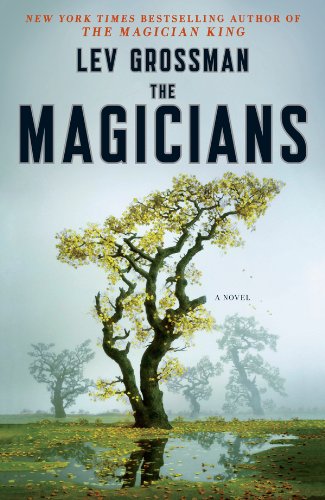Billed as an adult's Harry Potter, The Magicians is a compelling but ultimately flawed exploration of what it would truly be like to study magic and become a wizard in the real world.
To play out this premise, Lev Grossman presents Quentin Coldwater, a frustrated, cynical--which is to say typical--teenager who dreams of escaping to a magical world. Quentin gets his wish in the form of an invitation to attend wizard college at Brakebills, but the magic he finds their isn't the liberating whimsical kind Harry discovered at Hogwarts. Instead, at Brakbills, mastering magic is a tedious sometimes painful affair that nearly robs students of their very humanity.
There's a lot to like about this take on magic--a more mature realistic imagining of what it would take to be a wizard. You can't help but see parallels to the pursuit of an artistic education, and the novel works best as an interesting parable on the creative life. One the surface both magic and art would seem to be thrilling and wondrous things to study, but in reality learning the craft of each is demanding and at times soul crushing.
The problem for me is that Grossman seems to get lost in proving this contrary point. He spends so much time at Brakebills and Brakebills South showing the reader that true magical study is nothing like Hogwarts, that the plot fails to advance for a significant portion of the novel.
When we do leave Brakebills, Grossman remains intent on this contrary portrayal of the wizarding life being not all its cracked up to be. Some of this is compelling as a quasi-parable on the post-college experience. When Alice and Quentin visit her parents, for instance, it's funny to see how her father's magical skills manifest merely in his banal yet complicated reproductions of ancient architecture. Alice and Quentin's horrified realization--"My God, is this really what people do with all that stuff I've been studying for the last four years"--is one with which any recent college grad with an internship can identify.
The problem, however, is that Grossman goes too far in his insistence (or assumption) that the post-Brakebills world would be empty of any meaning or purpose for the young wizards. The fact that they can find no good uses for their powers seems hard to believe. Would these kids really want to run off to fight battles between rabbits in the mythical Fillory rather than take on international terrorists and evil dictators in this world.
To be fair, there could be reasons to choose the former, but Grossman never even allows his wizards to entertain this possibility. Instead, Quentin spends his post-Brakebills days wasting away in a haze of parties, drugs, and sex because, as he sees it, there's nothing worth conjuring for. When the chance to travel to Fillory comes along, it's presented as this opportunity for true purpose that can finally save Quentin from this meaningless existence. But I can't help but wonder how Quentin can find more meaning in a storybook world than in the real one.
Of course, that is Grossman's point about Quentin. This is his fatal flaw--his grass-is-always-greener obsession with leaving his mundane life for an exciting fantasy. Still, it's too much of a stretch to believe that none of these characters would explore the option of playing superhero in this world before fleeing to Fillory. Grossman implies that there are clearly no opportunities for heroes in this world, but I find that hard to buy without seeing the characters at least make some attempt in that direction before finding it unsatisfying.
Still, I enjoyed the premise of the book, and found the story compelling once the characters left the tedium of Brakebills and got on with their adventures in Fillory. Perhaps in his attempt to show that true magic would be far less wondrous and magical than the Harry Potter series presents it Grossman is guilty of one only thing--succeeding.


No comments:
Post a Comment